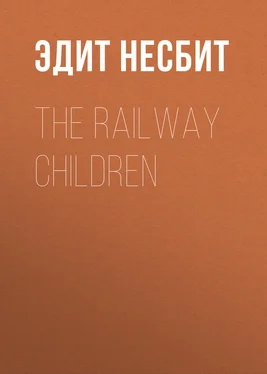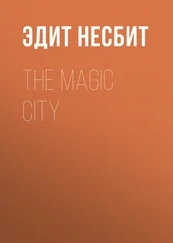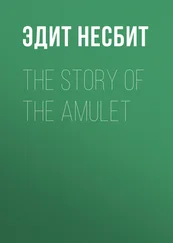Эдит Несбит - The Railway Children
Здесь есть возможность читать онлайн «Эдит Несбит - The Railway Children» — ознакомительный отрывок электронной книги совершенно бесплатно, а после прочтения отрывка купить полную версию. В некоторых случаях можно слушать аудио, скачать через торрент в формате fb2 и присутствует краткое содержание. Жанр: foreign_children, foreign_antique, foreign_prose, на английском языке. Описание произведения, (предисловие) а так же отзывы посетителей доступны на портале библиотеки ЛибКат.
- Название:The Railway Children
- Автор:
- Жанр:
- Год:неизвестен
- ISBN:нет данных
- Рейтинг книги:5 / 5. Голосов: 1
-
Избранное:Добавить в избранное
- Отзывы:
-
Ваша оценка:
- 100
- 1
- 2
- 3
- 4
- 5
The Railway Children: краткое содержание, описание и аннотация
Предлагаем к чтению аннотацию, описание, краткое содержание или предисловие (зависит от того, что написал сам автор книги «The Railway Children»). Если вы не нашли необходимую информацию о книге — напишите в комментариях, мы постараемся отыскать её.
The Railway Children — читать онлайн ознакомительный отрывок
Ниже представлен текст книги, разбитый по страницам. Система сохранения места последней прочитанной страницы, позволяет с удобством читать онлайн бесплатно книгу «The Railway Children», без необходимости каждый раз заново искать на чём Вы остановились. Поставьте закладку, и сможете в любой момент перейти на страницу, на которой закончили чтение.
Интервал:
Закладка:
E. Nesbit
The Railway Children
Chapter I. The beginning of things
They were not railway children to begin with. I don’t suppose they had ever thought about railways except as a means of getting to Maskelyne and Cook’s, the Pantomime, Zoological Gardens, and Madame Tussaud’s. They were just ordinary suburban children, and they lived with their Father and Mother in an ordinary red-brick-fronted villa, with coloured glass in the front door, a tiled passage that was called a hall, a bath-room with hot and cold water, electric bells, French windows, and a good deal of white paint, and ‘every modern convenience’, as the house-agents say.
There were three of them. Roberta was the eldest. Of course, Mothers never have favourites, but if their Mother HAD had a favourite, it might have been Roberta. Next came Peter, who wished to be an Engineer when he grew up; and the youngest was Phyllis, who meant extremely well.
Mother did not spend all her time in paying dull calls to dull ladies, and sitting dully at home waiting for dull ladies to pay calls to her. She was almost always there, ready to play with the children, and read to them, and help them to do their home-lessons. Besides this she used to write stories for them while they were at school, and read them aloud after tea, and she always made up funny pieces of poetry for their birthdays and for other great occasions, such as the christening of the new kittens, or the refurnishing of the doll’s house, or the time when they were getting over the mumps.
These three lucky children always had everything they needed: pretty clothes, good fires, a lovely nursery with heaps of toys, and a Mother Goose wall-paper. They had a kind and merry nursemaid, and a dog who was called James, and who was their very own. They also had a Father who was just perfect—never cross, never unjust, and always ready for a game—at least, if at any time he was NOT ready, he always had an excellent reason for it, and explained the reason to the children so interestingly and funnily that they felt sure he couldn’t help himself.
You will think that they ought to have been very happy. And so they were, but they did not know HOW happy till the pretty life in the Red Villa was over and done with, and they had to live a very different life indeed.
The dreadful change came quite suddenly.
Peter had a birthday—his tenth. Among his other presents was a model engine more perfect than you could ever have dreamed of. The other presents were full of charm, but the Engine was fuller of charm than any of the others were.
Its charm lasted in its full perfection for exactly three days. Then, owing either to Peter’s inexperience or Phyllis’s good intentions, which had been rather pressing, or to some other cause, the Engine suddenly went off with a bang. James was so frightened that he went out and did not come back all day. All the Noah’s Ark people who were in the tender were broken to bits, but nothing else was hurt except the poor little engine and the feelings of Peter. The others said he cried over it—but of course boys of ten do not cry, however terrible the tragedies may be which darken their lot. He said that his eyes were red because he had a cold. This turned out to be true, though Peter did not know it was when he said it, the next day he had to go to bed and stay there. Mother began to be afraid that he might be sickening for measles, when suddenly he sat up in bed and said:
“I hate gruel—I hate barley water—I hate bread and milk. I want to get up and have something REAL to eat.”
“What would you like?” Mother asked.
“A pigeon-pie,” said Peter, eagerly, “a large pigeon-pie. A very large one.”
So Mother asked the Cook to make a large pigeon-pie. The pie was made. And when the pie was made, it was cooked. And when it was cooked, Peter ate some of it. After that his cold was better. Mother made a piece of poetry to amuse him while the pie was being made. It began by saying what an unfortunate but worthy boy Peter was, then it went on:
He had an engine that he loved
With all his heart and soul,
And if he had a wish on earth
It was to keep it whole.
One day—my friends, prepare your minds;
I’m coming to the worst—
Quite suddenly a screw went mad,
And then the boiler burst!
With gloomy face he picked it up
And took it to his Mother,
Though even he could not suppose
That she could make another;
For those who perished on the line
He did not seem to care,
His engine being more to him
Than all the people there.
And now you see the reason why
Our Peter has been ill:
He soothes his soul with pigeon-pie
His gnawing grief to kill.
He wraps himself in blankets warm
And sleeps in bed till late,
Determined thus to overcome
His miserable fate.
And if his eyes are rather red,
His cold must just excuse it:
Offer him pie; you may be sure
He never will refuse it.
Father had been away in the country for three or four days. All Peter’s hopes for the curing of his afflicted Engine were now fixed on his Father, for Father was most wonderfully clever with his fingers. He could mend all sorts of things. He had often acted as veterinary surgeon to the wooden rocking-horse; once he had saved its life when all human aid was despaired of, and the poor creature was given up for lost, and even the carpenter said he didn’t see his way to do anything. And it was Father who mended the doll’s cradle when no one else could; and with a little glue and some bits of wood and a pen-knife made all the Noah’s Ark beasts as strong on their pins as ever they were, if not stronger.
Peter, with heroic unselfishness, did not say anything about his Engine till after Father had had his dinner and his after-dinner cigar. The unselfishness was Mother’s idea—but it was Peter who carried it out. And needed a good deal of patience, too.
At last Mother said to Father, “Now, dear, if you’re quite rested, and quite comfy, we want to tell you about the great railway accident, and ask your advice.”
“All right,” said Father, “fire away!”
So then Peter told the sad tale, and fetched what was left of the Engine.
“Hum,” said Father, when he had looked the Engine over very carefully.
The children held their breaths.
“Is there NO hope?” said Peter, in a low, unsteady voice.
“Hope? Rather! Tons of it,” said Father, cheerfully; “but it’ll want something besides hope—a bit of brazing say, or some solder, and a new valve. I think we’d better keep it for a rainy day. In other words, I’ll give up Saturday afternoon to it, and you shall all help me.”
“CAN girls help to mend engines?” Peter asked doubtfully.
“Of course they can. Girls are just as clever as boys, and don’t you forget it! How would you like to be an engine-driver, Phil?”
“My face would be always dirty, wouldn’t it?” said Phyllis, in unenthusiastic tones, “and I expect I should break something.”
“I should just love it,” said Roberta—“do you think I could when I’m grown up, Daddy? Or even a stoker?”
“You mean a fireman,” said Daddy, pulling and twisting at the engine. “Well, if you still wish it, when you’re grown up, we’ll see about making you a fire-woman. I remember when I was a boy—”
Just then there was a knock at the front door.
“Who on earth!” said Father. “An Englishman’s house is his castle, of course, but I do wish they built semi-detached villas with moats and drawbridges.”
Читать дальшеИнтервал:
Закладка:
Похожие книги на «The Railway Children»
Представляем Вашему вниманию похожие книги на «The Railway Children» списком для выбора. Мы отобрали схожую по названию и смыслу литературу в надежде предоставить читателям больше вариантов отыскать новые, интересные, ещё непрочитанные произведения.
Обсуждение, отзывы о книге «The Railway Children» и просто собственные мнения читателей. Оставьте ваши комментарии, напишите, что Вы думаете о произведении, его смысле или главных героях. Укажите что конкретно понравилось, а что нет, и почему Вы так считаете.












